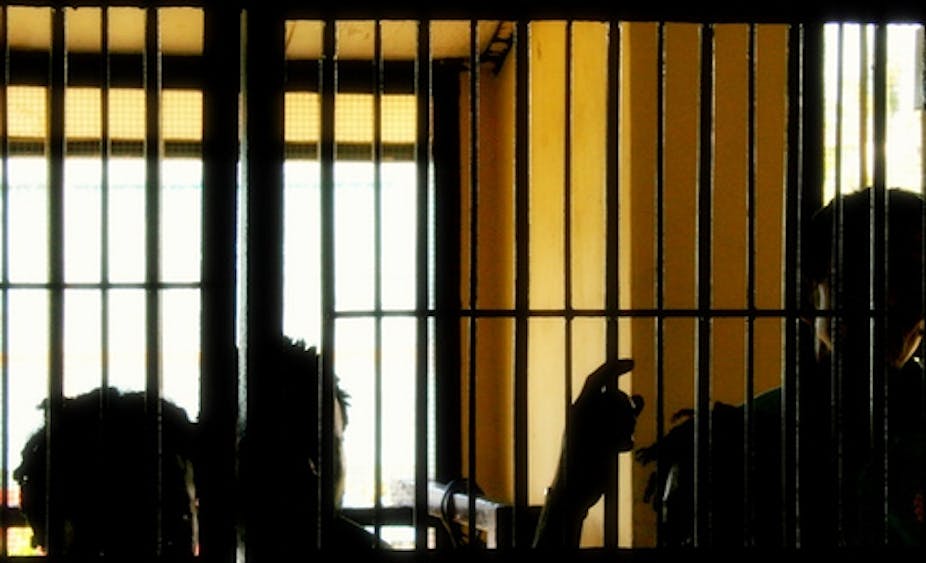What is the role of the criminal law?
In parts of modern day Asia, the criminal law has had another, more troubling, purpose in addition to convicting murders and rapists: protecting those in authority against criticism.
Andy Hall, a UK human rights activist, currently finds himself facing two years jail and a possible A$100 million fine. He is charged with criminal defamation in Thailand over a report he wrote (and stands by) that was critical of the conditions faced by Burmese migrant workers. He will reappear in Bangkok South Criminal Court today.
In Asia, journalists and human rights activists often find themselves on the wrong end of a criminal prosecution. For example, Thai activist Somyot Prueksakasemsuk has recently been sentenced to 11 years in prison and in another case with a closer link to Australia, there has been the jailing of another Thai man, Ekachai Hongkangwan, for selling an ABC Foreign Correspondent documentary. Both were charged under lèse-majesté laws (insulting the monarch).
But in this particular case, the government is using the criminal law to protect local business - not just itself - against its critics. The Thai government is not alone in this. The businesses concerned most often are large and well-connected with strategic international interests. The logic goes something like this: “if you damage the reputation of this large business you will tarnish the reputation of us the host nation”.
At the extreme, this can lead to a charge of treason against an individual, even if the criticism exposes some significant wrong doing by the company involved. This was the situation for Stanley Adams, who found himself charged with espionage and treason by the Swiss federation in 1984 for blowing the whistle on illegal anti-competitive conduct by his former employer Hoffman-La Roche.
The case of Andy Hall may continue for some weeks beyond today’s court appearance. But what is his alleged crime?
The Natural Fruit Company has claimed that Hall criminally defamed the company by falsely accusing them of employing child labour, paying wages below the legal minimum and providing no holiday or bonus pay contrary to Thai law. The criminal aspect of the case relates to broadcasting of these allegedly false statements.
Hall has worked for nearly a decade in championing the rights of Burmese migrant workers in Thailand. The particular report at the centre of this case comes from Finnwatch, a Finnish NGO, concerns the ill-treatment of Burmese migrant workers by two tuna companies and the fruit processing company Natural Fruit.
In the report, Finnwatch catalogues the harsh conditions at Natural Fruit, a pineapple processing plant, a problem made worse by the vulnerable position of the workers, many of whom had entered the country illegally with the help of smugglers. Natural Fruit supplies a number of high profile European brands. According to the report, the migrants “were completely dependent on the factory and its illegal collaboration with the local police”.
The research upon which the report is based was undertaken by Andy Hall. He stands by his work, saying:
Given the attention I pay to uncovering the truth through my reliable and migrant participant centred research, and given I have copies of pay slips, name cards and other documents collected during my research relating to Natural Fruit, as well as recordings of all interviews undertaken, I stand by the findings of this research as I submitted to Finnwatch.
The importance of this case goes well beyond the challenges faced by Hall. Accurate information on the harms perpetrated by international business is the fulcrum by which improvements in standards of all businesses depend. NGOs working with local researchers often are critical to the collection of this information. This is particularly the case where international supply chains are involved and where abuse is embedded within business relationships that extend across multiple borders before the ultimate consumer is reached.
But these relationships can also be a source of improvement where high-profile firms such as Nike monitor their suppliers. Such monitoring often is put into place as a response to international pressure. This may yet be the outcome of the Finnwatch report on Natural Fruits and their European partners. These systems are not perfect, but they can represent progress. Again, though, accurate on the ground information of how improvements are and are not made as a result of these monitoring systems is critical.
Local research of this kind is also essential to ensure compliance with local laws, not only international standards. Indeed the Natural Fruits case largely revolves around that company’s compliance with local Thai law. The pressure of international NGOs can be important, but ultimately a state must protect its own citizens with its own laws.
The first step in this process, however, is not to charge those undertaking and publicising their research with committing a crime of treason, lèse majesté or criminal defamation.

